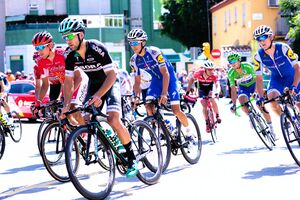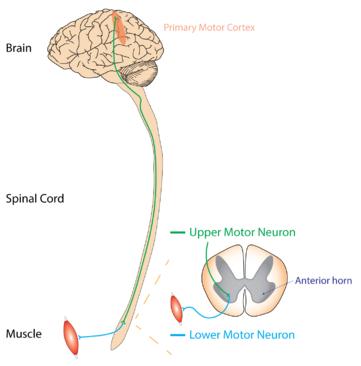Muscle Fatigue
Original Editor - Lucinda hampton
Top Contributors - Lucinda hampton and Kim Jackson
Introduction[edit | edit source]
Repeated, intense use of muscles leads to a decline in performance known as muscle fatigue.[1] Muscle fatigue is a commonly experienced phenomenon that limits athletic performance and other strenuous or prolonged activity. It is also increases and restricts daily life under various pathological conditions, including neurological, muscular (eg MND) and cardiovascular disorders, as well as ageing and frailty[2].
- When you experience fatigue, the force behind your muscles’ movements decrease, causing you to feel weaker.[3]
Exercise and Muscle Fatigue[edit | edit source]
Physical exercise affects the biochemical equilibrium within the exercising muscle cells. Eg, inorganic phosphate ( in ATP), protons, lactate ( see anaerobic capacity ) and free Mg2+ (an electrolyte) accumulate within these cells. These biochemical products directly affect the mechanical machinery of the muscle cell eg mitochondria . Furthermore, they negatively affect the different muscle cell organelles that are involved in the transmission of neuronal signals. The muscle metabolites produced, and the generated heat of muscle contraction, are released into the internal environment, putting stress on its steady state.
- The tremendous increase in muscle metabolism compared with rest conditions induces an immense increase in muscle blood supply, causing an increase in the blood circulatory system and gas exchange. Nutrients have to be supplied to the exercising muscle, emptying the energy stocks elsewhere in body. Furthermore, the contracting muscle fibres release cytokines, which in their turn create many effects in other organs, including the brain.
- All these different mechanisms sooner or later create sensations of fatigue and exhaustion in the mind of the exercising subject. The final effect is a reduction or complete cessation of the exercise.
- Many diseases speed up the depletion of the energy stocks within the body. So diseases amplify the effect of energy stock depletion that accompanies exercise.[4].eg MS.
Mechanisms of Fatigue[edit | edit source]
Muscle fatigue can occur in two basic mechanisms: involves within the motor units (i.e., motor neurons, peripheral nerves, motor endplates, muscle fibers).
- Peripheral fatigue is produced by changes at or distal to the neuromuscular junction[2]. The cause may be the depletion of some necessary substance(s)) and/or the accumulation of catabolites or other substances set free by the muscle activity.
- Central fatigue originates at the central nervous system (CNS), which decreases the neural drive to the muscle.[2] It is caused by an inhibition elicited by nervous impulses from receptors (probably some kind of chemoreceptors) in the fatigued muscles. The inhibition may act on the motor pathways anywhere from the voluntary centers in the brain to the spinal motor neurons. This kind of fatigue manifests itself by a decrease in the outflow of motor impulses to the muscles.[5].
Symptoms[edit | edit source]
When you experience fatigue, the force behind the muscles’ movements decrease, causing you to feel weaker, often this weakness is the initial sign[6]. Other symptoms associated with muscle fatigue include: soreness; localized pain; shortness of breath; muscle twitching; trembling; a weak grip; muscle cramps.[3]
Treatment[edit | edit source]
There are no formal guidelines for treating muscle fatigue as a symptom. Treatment depends on the underlying cause of muscle fatigue and accompanying symptoms. If muscle fatigue, especially if it’s unrelated to exercise, a doctors assessment is needed to evaluate clients medical history and symptoms to rule out more serious health conditions. In many cases, your muscle fatigue will improve with rest and recovery. Staying hydrated and maintaining a healthy diet can also improve your recovery.[3]. Overcoming it requires a plan involving nutrition, recovery, stretching, resting, and maintaining the right attitude.
Tips for exercising
- Take time to recover: Always take at least one day a week off to allow your body to recover and stay hydrated.
- Cool down: If you're doing weight training or any type of resistance training, it may be helpful to do an aerobic cool down afterwards such as a light jog or bike ride. If you're doing more endurance training eg a long bike rides, a shorter ride might be beneficial the next day. The goal of these activities is to decrease the amount of by products of exercise in your body eg Lactic acid,. Another way to reduce lactic acid, is to wear compression stockings while working out.
- Listen to your bod: Pay attention to your body’s signals. Prevention of muscle fatigue is always better than treatment. If you notice that you're lifting too much and you're very sore afterwards, cut back. If your activities are followed by severe pain or changes in the color of your urine, you should seek medical attention[6]. See rabdomyolisis
Potential Treatment for Muscle Fatigue[edit | edit source]
Improper exercise, long time combat, military training and some related diseases (eg cancer and stroke) can cause muscle fatigue, which negatively affects athletic achievement, military combat ability and patient recovery. At present, there are still no official or semi-official recommendations for the treatment of muscle fatigue. However, some nonspecific treatments, such as synthetic products (eg amphetamine and caffeine), natural products (eg ginseng and rhodiola rosea) and nutritional supplements (eg vitamins and minerals and creatine), have been used clinically or experimentally, and have shown some effects in various studies.
Synthetic products (see Effects of Performance Enhancing Drugs)
- Amphetamines, ephedrine, and caffeine are synthetic products that promote resistance to muscle fatigue. These products are sometimes common in sport for enhancing performance
- Caffeine is legal in sports and has a similar effect on muscles. High doses of caffeine can enhance athletic performance during exercise. See Caffeine
Natural products
- Ginseng is a herb with several possible health benefits eg relieving muscle fatigue.
- Garlic may also reduce muscle fatigue[2].
Nutritional supplements
- Dietary supplements include products such as multivitamins or fish oil[2]. Lacking certain nutrients in the diet can lead to muscle problems. eg a lack of vitamin D can cause muscle fatigue. Dietary supplements can help provide enough nutrition to keep muscles healthy.
Ergogenic aids.
- Many people use ergogenic aids, such as creatine (see link), in sport to improve muscle performance. This is a naturally occurring acid that helps to provide muscles with energy during movement.
Sports foods contain a variety of substances that provide energy to muscles and improve performance. eg the energy drink Red Bull contains a mixture of carbohydrates, taurine, and caffeine.These products may suggest that they help reduce muscle fatigue, but the scientific evidence for these claims is lacking[7]
- See also Exercise and Protein Supplements.
References[edit | edit source]
- ↑ Allen DG, Lamb GD, Westerblad H. Skeletal muscle fatigue: cellular mechanisms. Physiological reviews. 2008.Available:https://journals.physiology.org/doi/full/10.1152/physrev.00015.2007 (accessed 18.11.2021)
- ↑ 2.0 2.1 2.2 2.3 2.4 Wan JJ, Qin Z, Wang PY, Sun Y, Liu X. Muscle fatigue: general understanding and treatment. Experimental & molecular medicine. 2017 Oct;49(10):e384-. Available: https://www.nature.com/articles/emm2017194/(accessed 19.11.2021)
- ↑ 3.0 3.1 3.2 Health Line Muscle Fatigue Available:https://www.healthline.com/health/muscle-fatigue (accessed 18.11.2021)
- ↑ Ament W, Verkerke GJ. Exercise and fatigue. Sports medicine. 2009 May;39(5):389-422. Available:https://pubmed.ncbi.nlm.nih.gov/19402743/ (accessed 18.11.2021)
- ↑ Coaching science abstracts reviews articles concerned with types of exercise fatigue and their effects on bodily function. Fatigue in Exercise Available: https://coachsci.sdsu.edu/csa/vol65/table.htm (accessed 18.11.2021)
- ↑ 6.0 6.1 Tufts Medical Centre 3 ways to recover from muscle fatigue Available: https://www.tuftsmedicalcenter.org/news-events-media/news/web/3-tips-on-how-to-recover-from-muscle-fatigue(accessed 18.11.2021)
- ↑ Medical news today What to know about muscle fatigue Available:https://www.medicalnewstoday.com/articles/326315 (accessed 18.11.2021)












